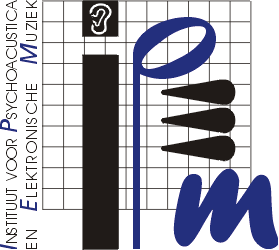» By Joren on Friday 27 May 2011
 The 25th of May 2011 Tarsos was present at the IPEM (Institute for Psychoacoustics and Electronic Music) open house.
The 25th of May 2011 Tarsos was present at the IPEM (Institute for Psychoacoustics and Electronic Music) open house.
IPEM (Institute for Psychoacoustics and Electronic Music) is the research center of the Department of Musicology, which is part of the Department of Art, Music and Theater Studies of Ghent University. IPEM provides a scientific basis for the cultural and creative sector, especially for music and performance arts, and does pioneering research work on the relationship between music body movement and new technologies. The institute consists of an interdisciplinary team but also welcomes visiting researchers from all over the world. One of its aims is also to actively try and validate research results during public events and by means of user studies.
There are close relations between the Royal Conservatory Ghent, where we are located, and IPEM. There is more information about the IPEM open house available. Also available is the program of the IPEM open house 2011
Tarsos was presented using a poster, a flyer and a live demo. The “poster about Tarsos”:[tarsos_poster.pdf] and the “flyer about Tarsos”:[tarsos_flyer.pdf] are both downloadable.
 HoGent, Tarsos, Computational ethnomusicology, featured, Presentation, and Computational musicology
HoGent, Tarsos, Computational ethnomusicology, featured, Presentation, and Computational musicology
 tarsos_poster.pdf, ipem_logo.gif, and tarsos_flyer.pdf
tarsos_poster.pdf, ipem_logo.gif, and tarsos_flyer.pdf
» By Joren on Friday 27 May 2011
This article describes how to make sun-java6 play nice with the PulseAudio sound sytem on Ubuntu with an x64 processor architecture. With some changes the method should also work with other operating systems and other platforms.
The default way sun-java6 operates with respect to sound on Ubuntu is, well unrespectfull. When playing audio it claims an audio device, which then can not be used any more by other applications trying to access the same device. This is far from ideal. Also changing audio interfaces (by e.g. plugging in a USB audio interface) goes wrong most of the time.

These problems are addressed by PulseAudio and there is a way to make sun-java6 aware of PulseAudio on Ubuntu. The OpenJDK does this automatically but it has some other, unrelated, issues. If you want to use PulseAudio with java6 on Ubuntu x64 you need copy “pulse-java.jar”:[pulse-java.jar] and platform dependent “libpulse-java.so”:[libpulse-java.so] file to correct JVM directories. To make it easy you can execute these commands:
```ruby\
wget http://tarsos.0110.be/attachment/cons/255/libpulse-java.so\
sudo cp libpulse-java.so /usr/lib/jvm/java-6-sun/jre/lib/amd64
wget http://tarsos.0110.be/attachment/cons/256/pulse-java.jar\
sudo cp pulse-java.jar /usr/lib/jvm/java-6-sun/jre/lib/ext\
```
From this moment on the “PulseAudio Mixer” is available for Java applications. Sharing, switching and assigning audio devices to Java programs is as a result smooth. To use the PulseAudio Mixer by default you need to change sound.properties which can be found at /usr/lib/jvm/java-6-sun/jre/lib/sound.properties. Details can be found here.
 Java, Code, and HoGent
Java, Code, and HoGent
 libpulse-java.so, pulseaudio_logo.png, and pulse-java.jar
libpulse-java.so, pulseaudio_logo.png, and pulse-java.jar
» By Joren on Wednesday 18 May 2011
Vorige zaterdag werd Apps For Ghent georganiseerd: een activiteit om het belang van open data te onderstrepen in navolging van onder meer Apps For Amsterdam en New York City Big App. Tijdens de voormiddag kwamen er verschillende organisaties hun open gestelde data voorstellen de namiddag werd gereserveerd voor een wedstrijd. Het doel van de wedstrijd was om in enkele uren een concept uit te werken en meteen voor te stellen. Het uitgewerkte prototype moest gedeeltelijk functioneren en gebruik maken van (Gentse) open data.
Luk Verhelst en ikzelf hebben er TwinSeats voorgesteld.
 TwinSeats is een website / online initiatief om nieuwe mensen te leren kennen. Met hen deel je dezelfde culturele interesse en ga je vervolgens samen naar deze of gene voorstelling. Door events centraal te stellen kan TwinSeats uitzonderlijke cultuurburen zoeken. Leden vinden die cultuurburen dankzij een gezamenlijke voorliefde voor een artiest of attractie of eender welke bezigheid in de vrijetijdssfeer.
TwinSeats is een website / online initiatief om nieuwe mensen te leren kennen. Met hen deel je dezelfde culturele interesse en ga je vervolgens samen naar deze of gene voorstelling. Door events centraal te stellen kan TwinSeats uitzonderlijke cultuurburen zoeken. Leden vinden die cultuurburen dankzij een gezamenlijke voorliefde voor een artiest of attractie of eender welke bezigheid in de vrijetijdssfeer.
Het prototype is ondertussen terug te vinden op TwinSeats.be. Let wel dit is in enkele uren in elkaar geflanst en is verre van ‘af’, het achterliggende concept is belangrijker.
Samen met Wa Kank Doen van SumoCoders werden we door de jury tot winnaar uitgeroepen. Maandag verscheen er een artikel in de Standaard over AppsForGhent met een vermelding van TwinSeats. Op de Apps For Ghent site is uiteraard ook iets te vinden over TwinSeats ook het juryverslag is er te vinden. Zoals het hoort bij die categorie evenementen werd ook wat afgetweet.
Er is ook een publieksprijs verbonden aan AppsForGhent die wordt over enkele weken uitgereikt.
 Code, 0110.be, Hackerspace Ghent, Portfolio, and Projecten
Code, 0110.be, Hackerspace Ghent, Portfolio, and Projecten
» By Joren on Friday 13 May 2011
 Tarsos will be presented at the First International Workhop of Folk Music Analysis: Symbolic and Signal Processing:
Tarsos will be presented at the First International Workhop of Folk Music Analysis: Symbolic and Signal Processing:
“The First International Workhop of Folk Music Analysis: Symbolic and Signal Processing, will take place in Athens, Greece, on the 19th and 20th of May, 2011. … The purpose of the event is to gather reseachers who work in the area of computational folk music analysis, using symbolic or singal processing methods, to present their work, discuss and exchange views on the topic.”
The “submitted abstract about Tarsos”:[Tarsos_FMA_2011.pdf] can be downloaded. “A presentation about Tarsos”:[2011-05-20-tarsos_at_athens.pdf] is also available.
 Computational musicology, Presentation, featured, HoGent, and Tarsos
Computational musicology, Presentation, featured, HoGent, and Tarsos
 Tarsos_FMA_2011.pdf and 2011-05-20-tarsos_at_athens.pdf
Tarsos_FMA_2011.pdf and 2011-05-20-tarsos_at_athens.pdf
 The 25th of May 2011 Tarsos was present at the IPEM (Institute for Psychoacoustics and Electronic Music) open house.
The 25th of May 2011 Tarsos was present at the IPEM (Institute for Psychoacoustics and Electronic Music) open house.

 TwinSeats is een website / online initiatief om nieuwe mensen te leren kennen. Met hen deel je dezelfde culturele interesse en ga je vervolgens samen naar deze of gene voorstelling. Door events centraal te stellen kan TwinSeats uitzonderlijke cultuurburen zoeken. Leden vinden die cultuurburen dankzij een gezamenlijke voorliefde voor een artiest of attractie of eender welke bezigheid in de vrijetijdssfeer.
TwinSeats is een website / online initiatief om nieuwe mensen te leren kennen. Met hen deel je dezelfde culturele interesse en ga je vervolgens samen naar deze of gene voorstelling. Door events centraal te stellen kan TwinSeats uitzonderlijke cultuurburen zoeken. Leden vinden die cultuurburen dankzij een gezamenlijke voorliefde voor een artiest of attractie of eender welke bezigheid in de vrijetijdssfeer. Tarsos will be presented at the
Tarsos will be presented at the